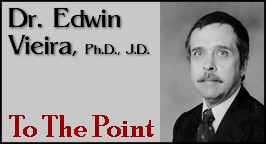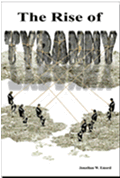THE
POVERTY OF POLITICAL DISCOURSE
PART 3 of 3
By
Dr. Edwin Vieira, Jr., Ph.D., J.D.
April 28, 2010
NewsWithViews.com
To be sure, if Mr. Obama, in his assumed capacity as “Commander in Chief * * * of the Militia of the several States”, were to appoint me as his special Militia aide de camp with authority to travel from State to State, encouraging, advising, and assisting the legislatures and governors to enact suitable legislation to revitalize the Militia, I should certainly be willing to take on that assignment. Then, I suppose, I could accurately be described as the “Architect of Militias”. Then, too, I should be furthering the plan that has been attributed to Mr. Obama to create a new civilian national-security force at least as large as the regular Armed Forces. Actually, I should be making his plan constitutional, which would certainly be an elegant as well as practical way to establish “common ground” between Mr. Obama’s supporters and the many average Americans who are unsure of his commitment to such parts of the Constitution as the Second Amendment. I wonder if, now having offered my services in this regard, I can count on the support of the SPLC.
(g) Finally, the SPLC’s “profile” reports that “[i]n his book, How to Dethrone the Imperial Judiciary, Vieira advocates the impeachment of ‘advocacy judges’ who have authorized abortion and gay marriage”. Although I cannot ever recall using the clumsy term “advocacy judges” (which seems to have been coined by someone for whom English is a second or third language), I do advocate the impeachment of rogue judges (and all other rogue public officials) who violate their “Oath[s] or Affirmation[s], to support th[e] Constitution”, because any such violations surely constitute “high Crimes and Misdemeanors”. However, Imperial Judiciary does not focus on “abortion and gay marriage”. (Indeed, it would have been impossible for the book to have dealt directly with “gay marriage”, because the Supreme Court of the United States had never decided a case on that subject before the book was written.) Rather, as the book’s table of contents points out, Imperial Judiciary concerns itself with the improper reliance by some Justices of the Supreme Court on foreign law in their (mis)construction of the Constitution: namely,
Part I. The Illegitimate Insinuation of Foreign Law and Amorality into America’s Constitutional Jurisprudence. * * * * *Part II. Remedies for Certain Justices’ Promiscuous Use of Foreign Law in Constitutional Interpretation.
I realize that expecting the SPLC’s researchers actually to read the entirety of a 328-page book before they comment critically on its author may be hopelessly optimistic on my part. Yet, would it be too much to ask them to read one page from the table of contents?
In sum, if the SPLC’s general approach and its specific “profile” of me evidence the merits of its “Meet the ‘Patriots’” report, it has served up a dish of crude and inaccurate propaganda that would make even Goebbels gag.
So, what is “the bottom line” here? One need not be too cynical to suspect that the old adage in politics applies: “Follow the money!” The SPLC is improperly appropriating my name and reputation (and the names and reputations of other individuals), and intentionally slurring both in the process, in order to cadge donations.
For example, if the Ex-Lax company obtained a photo of me purchasing its product at my local drug store and then published that photo as part of an advertising campaign—“noted constitutional scholar and patriot relies on Ex-Lax”—as a way of increasing its sales and revenues, without my approval and without compensating me, I might sue the Ex-Lax company for unauthorized appropriation of my name for a commercial purpose. Of course, the Ex-Lax company would never do such a thing. But is that not exactly what the SPLC is doing, albeit in a negative manner? That is, hoping to rake in big bucks from credulous visitors to its web site through the unauthorized “profiling” of people whom the SPLC demonizes for the purpose of scaring the you-know-what out of potential contributors? Now, “Law” is part of the SPLC’s own name—so perhaps its researchers should know better. But, then, in its name “Poverty” comes before “Law”. And apparently its own “poverty” the SPLC seems most determined to overcome.
Having cleared up in this commentary the worst of the SPLC’s misrepresentations as to myself, I am not greatly perturbed by its silly “profile” of me. Perhaps the bad advertising SPLC is giving me, free of charge, will entice people of sound mind and good will to inquire into what I actually advocate. So the SPLC can be used, after all, for the good purpose of overcoming the evil that the SPLC supports—proving once again the wisdom in the folk saying, “It takes a crooked stick to beat a mad dog.”
APPENDIX
A
Letter to Robert Schulz concerning his Jekyll Island conference (20
May 2009)
THIS DOCUMENT MAY BE READ OR REPRODUCED, PHYSICALLY OR ELECTRONICALLY, ONLY IN ITS ENTIRETY.
20 May 2009
Dear Bob:
Contrary to rumors circulating in some quarters, I do not oppose in principle the idea of a new “Continental Congress” (or like effort), at which patriotic Americans could review the fundamental principles of our Constitution, catalogue violations of the Constitution by rogue public officials, and propose sound strategies for enforcing the Constitution in the future. To be credible and effective, however, any “Continental Congress” must operate according to carefully and clearly defined standards. To wit,
(1) The delegates who are selected must, first and foremost, be thoroughly knowledgeable about, and personally committed to the enforcement of, the Constitution and laws of the United States, as well as of their own States.
(2) The delegates must be selected by a thoroughly democratic process, involving the broadest practical segment of the population in each of their States and Localities.
(3) The delegates must be men and women well known and respected within their communities, with unblemished reputations for honesty, integrity, prudence, foresight, and the courage of their convictions.
(4) The delegates must be open to a full, fair, and frank discussion of all credible points of view, with the goal of creating a documentary and testimonial record of indisputable facts from which to draw legal conclusions and upon the basis of which to propose responsible courses of political action. The delegates should be bound by no rigid prior agenda that they must follow, no preconceived conclusions to which they must agree, and no unalterable plans for future actions that they must adopt. All decisions of the “Continental Congress” as a whole must be made by open and recorded roll-call votes.
(5) The delegates should assemble a staff of recognized experts in American history, constitutional law, political science, economics, and other relevant disciplines to assist them in their deliberations, as well as secretarial personnel to make and provide for the retention of complete and accurate records of the proceedings.
(6) The delegates should set as their goal the identification of solely those parts of the Constitution (including its Amendments) the immediate enforcement of which is critical to the preservation of America as a sovereign, independent, free, and prosperous republic, and then focus on precisely how such enforcement is to be accomplished in the most expeditious manner, and according to the prudential principle “first, do no harm”. When possible, a proposal that can be put into operation in one State at a time, and gradually refined and perfected on the basis of that experience, should be preferred to a proposal that requires a single, massive, and likely unsustainable nationwide effort.
(7) The delegates should entertain no proposal whatsoever for enforcement of the Constitution and laws that even arguably violates the Declaration of Independence, the Constitution, or the laws of the United States or of the several States made in pursuance of the Constitution. Indeed, any proposal that advocates the violation of law—and particularly any proposal that advocates or otherwise involves the incitement or employment of actual violence—should constitute sufficient grounds for expulsion from the “Continental Congress” sine die of any delegate, expert, or other party in attendance who sets it forth. To implement this requirement, at the commencement of proceedings the delegates should select from amongst themselves one or more “law officers”, with recognized expertise in that field, to provide guidance on the legality of any proposal placed before the “Continental Congress”.
No doubt other useful standards could be added to this list—and because this is your project, you must make the final determination as to what may be necessary and proper. But at least it is a reasonable beginning.
Finally, as I do for all men and women of good will who labor on America’s behalf, I wish you well in your work.
Edwin Vieira, Jr.
APPENDIX
B
E-mail to Robert Schulz concerning his Jekyll Island conference (26
May 2009)
Bob:
Just for the record--I was not “in absentia” at the recent Jekyll Island conference, as reported by you in your e-mail on the subject. That term implies that one is an attendee who simply could not show up, for one reason or another. I was not an attendee, but merely sent you a statement of my approval of “the Continental Congress idea”, provided that it was conducted according to certain standards, which I set out in some detail.
| Subscribe to the NewsWithViews Daily News Alerts! |
That, and only that, is the extent of my approval. Obviously, I do not necessarily support whatever was discussed or decided at the Jekyll Island conference, as I had no part in the discussions, deliberations, or decision-making. If people want to know my position on any of the issues ventilated at the conference, they must consult me directly, and not assume that any conclusions stated by the conference attendees reflect my position.
Thanks for keeping this clarification in mind in the future.
















